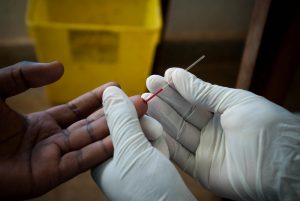Tens of thousands of patients going to St George’s, Epsom and St Helier’s emergency departments (EDs) have been tested for HIV in the past year, thanks to a pioneering scheme that helps people with the virus start treatment more quickly.
All three hospitals offer the opt-out testing – and carried out nearly 130,000 checks between April 2022 and September 2023. As a result, 33 people were diagnosed with HIV and able to receive effective early treatment and reduce onward transmission, and a further 19 previously diagnosed patients were re-engaged in care.
It also means people were able to access other support they may need, such as appointments with health advisors or psychologists who can help them come to terms with the diagnosis.
The figures have been released to mark World Aids Day, a global movement to unite people in the fight against HIV and AIDS, and comes as St George’s, Epsom and St Helier University Hospitals and Health Group sign up to become a founding organisation for the HIV Charter Mark. The charter has been established by the National Aids Trust to address HIV stigma and poor knowledge of HIV within healthcare settings.
Dr Richard Jennings, Group Chief Medical Officer at St George’s, Epsom and St Helier University Hospitals and Health Group, said: “HIV is a long-term manageable condition and people living with HIV have full healthy lives, but the earlier someone with HIV is diagnosed the better. An early diagnosis means effective treatment can be started, and effective treatment means a person cannot transmit HIV to other people and can stay well themselves.
“We have put a lot of work into routinely offering HIV testing to people who attend our emergency departments, and we are committed to increasing awareness, reducing stigma and training up our staff. It doesn’t stop there, however – we are on hand to deliver results to any patients who test positive and to talk through the developments in HIV care and the improved outcomes with treatment. We also offer free routine care and treatment to people who are living with HIV, and we offer psychological support.”
St Helier Hospital has been offering testing since 2019, though it had to pause it at points during the pandemic.
It has one of the highest testing uptakes in South London, with 90% of eligible patients having a blood test that can detect the virus – compared to just 11% in April 2022. In the six months alone between April and September 2023, 11,785 tests were carried out at the hospital.
Dr Olubanke Davies, a GUM/HIV Consultant based at Sutton Health and Care’s Rosehill Clinic, which is based at St Helier Hospital, said: “The earlier someone with HIV is diagnosed, the better. An early diagnosis means that they can start treatment and reduce the risk of developing severe illness.
“With the help of our colleagues in the emergency department, we’ve put a lot of work into routinely testing patients, increasing awareness and training up staff.”
To find out more about HIV – including getting tested, the symptoms, and living with the virus – visit:
https://www.nhs.uk/conditions/hiv-and-aids/
St George’s, Epsom and St Helier University Hospitals and Health Group
Image cc Unicef


